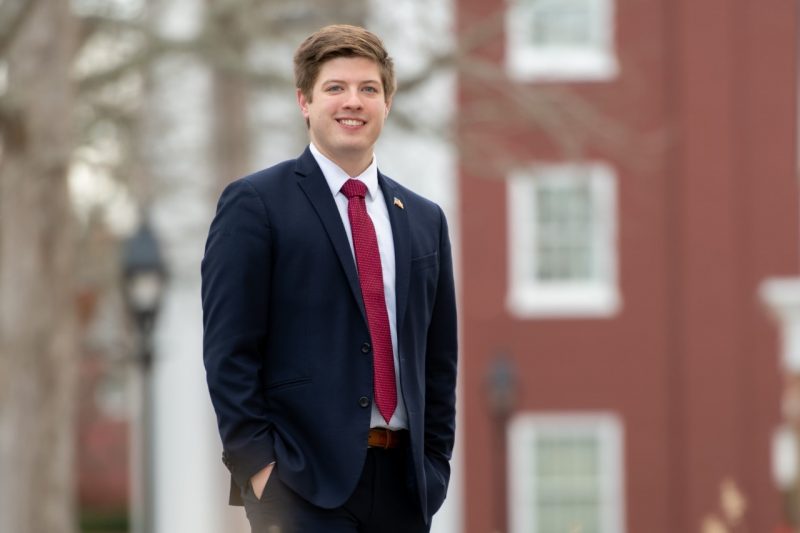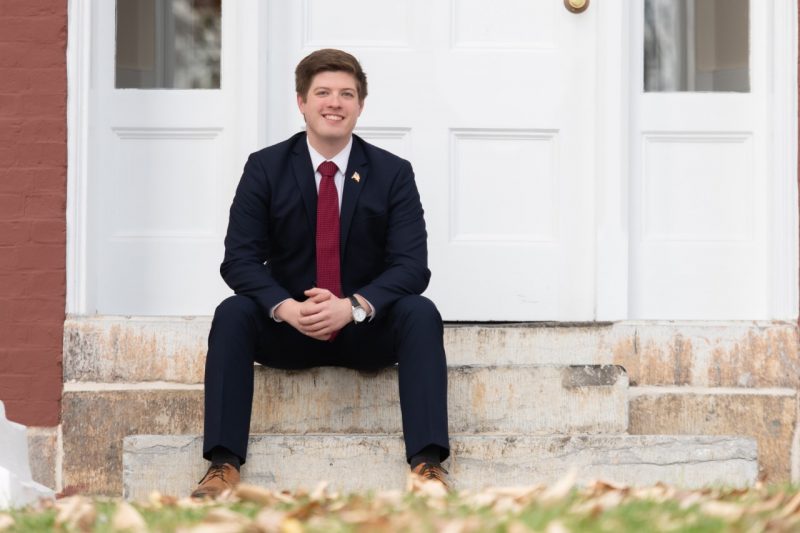A Passion for Politics Mock Con Political Chair John Harashinski '20 hopes to carry on the event's legacy of accurate predictions using lessons from courses in political analysis and leadership.
Hometown: Barnegat, New Jersey
Major: American Politics
Minor: Education Policy
“The invaluable lessons I have learned from Mock Con, both in political analysis and leadership, will undoubtedly carry with me into my future endeavors, whatever they may be.”
~ John Harashinski ’20
Q: Why are you interested in politics?
I have been interested in politics since high school. My AP American Government teacher instilled in me a passion for leadership and service, highlighting many exemplary figures throughout American history. Contrary to popular opinion, I have always thought that there are honorable politicians out there and have been motivated to find proof of this. Professor Connelly’s Washington Term class played a large part in confirming my belief that there are people who serve with integrity, honesty and dedication in their positions, and he instilled in all of us in that class the aspiration to be one of those individuals. While I am not sure if that path is right for me, I am fascinated by elections—the whole process on how and why people choose their leaders sparks a lot of curiosity in me. The adrenaline and thrill of running a campaign is very exciting to me and is something I was able to act on this past summer when I interned for a political strategy firm, Public Opinion Strategies in Washington, D.C.
Q: What does your role in Mock Con entail?
As the political chair for Mock Con, I oversee the entire predictive arm of the organization, ensuring accuracy for our nomination as well as the platform and speakers list. In this capacity, I lead a team of over 80 student analysts in our research efforts, while also serving at the chief analyst for the organization. In addition, as a member of the Steering Committee and the Executive Team, I am fortunate to be able to work very closely with the members of leadership in all departments of the organization to safeguard the mission of Mock Convention, embodied in our mission statement: Unite to Predict.
Q: Can you give us a peek into the work that goes on behind the scenes of Mock Con? How does each Mock Con participant – state delegates, specifically – play their part?
In years past, the predictive strategy has been held very close to the chest, but this year we are excited to make what we do more transparent. Everybody on the Political Team, stemming from the leading analysts all the way down to our 1,500 state delegates, work together to figure out who the eventual nominee will be for the Democratic Party. The state chairs oversee research efforts for their state by taking a deep dive into local media and by speaking with contacts on the ground. Delegates are welcome to take on as much or as little of that process as they so choose. We have delegates who are top researchers for their states, and we have delegates who are really excited to build the float—both are great for us. The awesome thing about being a state delegate is that you get to choose how much or how little involvement you want in the process. It is totally flexible, allowing students to fit in their commitment to Mock Convention while balancing all of their other activities.
Q: How do you ensure accuracy with each delegation’s research and with the prediction as a whole?
To ensure accuracy with the prediction, we have developed a three-pronged strategy to capture many facets of information coming out of the primary. The Trident Strategy, as we like to call it, consists of three distinct approaches: the National Approach, the Local Approach and the Metadata Approach.
The National Approach involves looking at everything from a 30,000-foot view—surveying trends across the nation and taking those into consideration with their historical context. National Political Analyst Kyle Perel ’20, Democratic Party Analyst Luke Basham ’20, and I spearhead this effort to quantify and predict momentum, which quite often can lead a candidate to victory.
The Local Approach is led by our seven regional chairs, guiding 57 state chairs and their delegations in an on-the-ground research effort. While polls are a great indicator to gauge public opinion, they sometimes do not accurately capture intensity levels or excitement that people have for a given candidate among voters or what voters really like about a candidate, which is what The Local Approach seeks to capitalize on. Passionate voters are the voters who will brave the cold Iowa winter to caucus for their candidate and represent a large subset of the Democratic primary electorate. By taking a deep dive into local media and by talking to contacts who live and work in each state, we seek to create an accurate picture of what people actually think.
Finally, we seek to complement all of this with the Metadata Approach, which is new this cycle. Through this, multiple quantitative metrics will be integrated into the prediction. These metrics include campaign finance data, demographic shifts and trends, campaign stops and attendance, and social media impact, among other data points. We learned in 2016 that big data is influential in elections, so we want to make sure that we factor that into our overall prediction. By combining all three of these facets, we hope to come to one cohesive conclusion, the Democratic nominee for President of the United States.
Q: Do you feel a lot of pressure to get the prediction right?
That is a question I get asked quite frequently. While I am truly humbled to be entrusted with carrying on the legacy of accuracy for which Mock Convention is known, I do not feel a lot of pressure because the team we have built is one of the best Mock Con has seen in years. We have some of the best and brightest minds on campus working on our team to carry on this tradition. With the incredible dedication, passion, and wits of our predictive team, I am confident that we will get it right.
Q: Have the impeachment proceedings impacted your work in any way?
In short, no, the impeachment proceedings have not impacted our work too much because they speak much more to the viability of President Trump’s reelection more so than who the nominee will be. If we were to also predict the general election, the impeachment proceedings would be something we would be watching with a keen eye, but since we are only focused on the Democratic Primary, we are only following it to the extent that the other candidates and likely Democratic primary voters are following it. National Political Analyst Kyle Perel ’20 has a great article discussing this further on the newly launched Political Hub, which can be found at mockconvention.com/political. This is a section of the website that features candidate biographies, links to news articles that what my team is reading, and an “Our Take” section featuring articles by myself and other leading analysts of Mock Convention.
Q: How has your academic work helped you in this role, and has your work on the Mock Con team impacted your future goals in any way?
My academic work has undoubtedly helped me in this role, both from a political and leadership standpoint. By taking multiple courses in the American Politics concentration, I have been able to get a better grasp on how context and historical trends matter in elections, alongside the successes and pitfalls of other campaigns. On the leadership front, the business courses I have taken, like Organizational Behavior with Professor Jeff Schatten, have helped me understand how organizations function and how to maximize their efficiency, something that is crucial when directing a team of over 1,500 students. In addition to all of that, the entire process has further entrenched my passion for politics and for a career in it. The invaluable lessons I have learned from Mock Con, both in political analysis and leadership, will undoubtedly carry with me into my future endeavors, whatever they may be.
Q: What has been the most entertaining or exciting part of the entire Mock Con experience for you?
It’s hard to narrow down, but the most entertaining part of the Mock Con experience for me has been fulfilling Mock Con’s mission of alumni engagement. I have been fortunate to go on the fundraising trips with other members of the Mock Con team and Mary Webster and Tom Lovell from the Alumni Engagement Office. Traveling around the country and listening to the stories of alumni of their own Mock Conventions has made me that much more excited to be a part of such an incredible organization.
However, the most exciting part of the entire Mock Con experience has been everything leading up to the prediction. No two days are alike in this primary, and as such it has been an exciting journey up to this point—we just can’t wait to show off all of our work!
If you know any W&L students who would be great profile subjects, tell us about them! Nominate them for a web profile.
 John Harashinski ’20, Mock Con 2020 political chair
John Harashinski ’20, Mock Con 2020 political chair John Harashinski ’20, Mock Con 2020 political chair
John Harashinski ’20, Mock Con 2020 political chair
You must be logged in to post a comment.